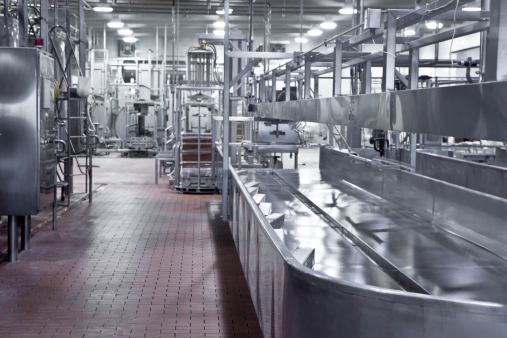Enclosure Air Conditioners in Food and Beverage: 3 Things to Know

Electric and electronic components used to operate equipment in the food and beverage industry, such as PLCs, motor starters, and VFDs are sensitive to moisture, contaminants, and excessive heat. In order to maintain efficiency and keep the plant running, these components must be kept at or below the manufacturer’s recommended safe operating temperature. At the same time, they must also remain free of moisture, dust, debris and corrosive chemicals.
Factories that prepare and package food and beverages present a difficult environment for valuable equipment, because the processes of storing, preparing and packaging consumables exposes everything in the plant to pervasive dust and debris, contaminants such as oils, waxes, and seasonings, and to microorganisms which spread diseases, such as salmonella. E. coli and listeria.
To maintain scrupulously clean surfaces throughout the factory requires strict cleaning and decontamination routines involving forceful water or dry ice sprays, as well as harsh cleansers and disinfectants.
The following three points should be kept in mind when selecting an enclosure cooling system for a food and beverage processing plant.
NEMA Type 4X
Industrial enclosures for most food and beverage applications must conform to the NEMA Type 4X specifications for an application that is subject to a regular schedule of plant or machine wash downs with water and/or chemicals. The NEMA Type 4X standard, published by the National Electrical Manufacturer’s Association, requires that the enclosure:
- Must be resistant to an intense water spray without allowing any water ingress
- Must pass a rigorous series of corrosion tests, including 1200 hours of exposure to moist air containing carbon dioxide and sulfur dioxide and 800 hours of salt spray tests
- Must be dustproof
- Must be resistant to damage caused by the formation of ice
Corrosion resistance
Generally, Type 4X enclosures are manufactured from stainless steel, as this provides the ideal substrate to resist the corrosion and weathering tests required to achieve the NEMA rating. The sloping top panel and smooth seam-welded edges of Thermal Edge Type 4X enclosure air conditioners are designed to prevent liquids from puddling on top after wash downs, which can lead to rust or an overgrowth of microorganisms.
Many enclosure cooling systems utilize aluminum filters that are not built to withstand harsh cleaning chemicals. Stainless steel filters can resist chlorine and other heavy chemicals better than aluminum. In addition, some models provide an extended filter capacity of 400%, which minimizes filter maintenance.
The NEMA 4X corrosion tests are limited to certain conditions. In the harsh food and beverage processing environment, the resistance of seals and other enclosure materials to particularly aggressive chemicals should be verified before use.
In some cases, a corrosion resistance package, which includes anti-corrosive coatings applied to condenser and evaporator coils and tubing, and deeper filters fitted to limit ingress of corrosive substances, should be specified. Higher grades of stainless steel, such as 316, also can be specified for an enclosure in harsher environments.
Closed loop cooling
Cooling options for a NEMA type 4X electrical enclosure are limited to those with active cooling technologies that do not allow contact with outside ambient air. However, a sealed enclosure will collect waste heat from the equipment as it operates, and will not be able to maintain the manufacturer’s suggested temperatures. Two practical closed loop cooling alternatives exist:
Air to air heat exchangers
Air to air heat exchangers rely on heat pipe technology, which uses an efficient coolant to absorb heat from the enclosure air. The heated liquid vaporizes, rises and gives off heat to the ambient air. Heat pipe technology is passive and requires no moving parts apart from air circulation fans.
Enclosure air conditioners
Although heat pipe technology is efficient, it cannot maintain an enclosure air temperature that is lower than the outside ambient air temperature. For higher heat loads and ambient temperatures an enclosure air conditioner solution is required.
For more information, or help in selecting an enclosure cooling system for a food and beverage application, contact our experts at Thermal Edge.
